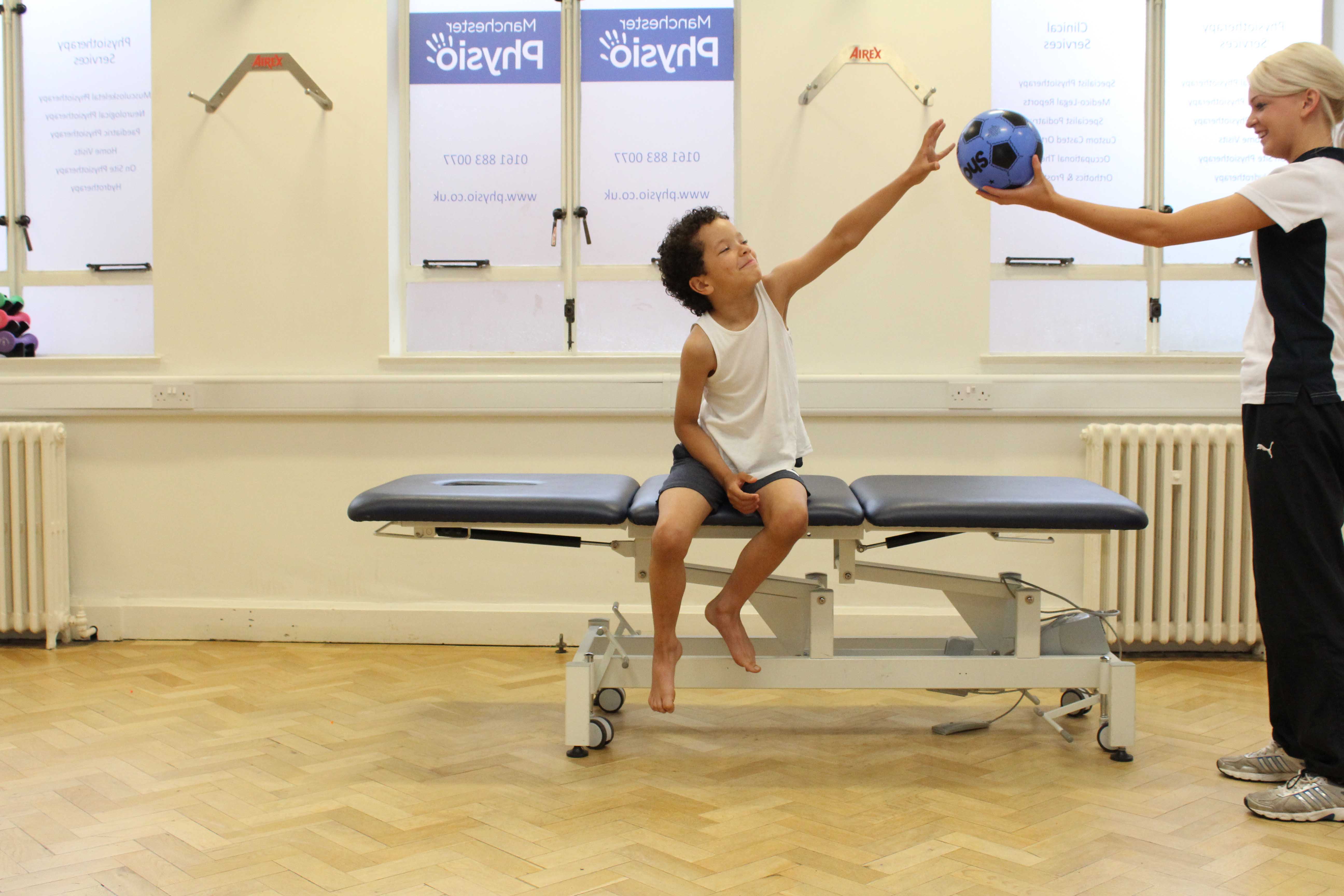What is encephalitis
Encephalitis is inflammation of the brain. This is different to meningitis which is inflammation of the tissues that surround the brain. Encephalitis causes a variety of physical symptoms that can be improved with physiotherapy treatment. Physiotherapy can help improve your baby’s rate of development via stretches and strengthening exercises delivered by a specialist paediatric physiotherapist with an in-depth understanding of the pathophysiology of encephalitis.
 Above: Gross motor skill exercises conducted by a paediatric neurological physiotherapist
Above: Gross motor skill exercises conducted by a paediatric neurological physiotherapistCauses of encephalitis
Encephalitis can be caused by a virus or bacteria.
Symptoms of encephalitis
Babies with encephalitis may appear drowsy and reluctant to take their feeds. They may seem irritable or develop seizures.
Diagnosis of encephalitis
Your baby may need to have a CT or MRI scan performed to enable the doctor to diagnose encephalitis. A lumbar puncture may also be required. This is the insertion of a needle into the spine to take a sample of cerebrospinal fluid.
Treatment of encephalitis
Babies with encephalitis will receive treatment on a special care baby unit in hospital. If the encephalitis is caused by a virus, they will need anti-viral medication and fluids via a drip.
As your baby recovers from encephalitis, it may become apparent that they have some brain damage. Some of the problems associated with brain damage are weakness in the arms, legs and torso and stiff, tight joints. Your baby may not be able to crawl or have difficulties with sitting up and maintaining balance. Sensation and co-ordination may be a problem and they may appear to have headaches, difficulty swallowing and speaking. At Physio.co.uk, we have specialist physiotherapists who are able to help with the symptoms of brain damage caused by encephalitis.
Physiotherapy for my baby after encephalitis
Once your baby is medically stable after an episode of encephalitis they will be discharged home with appropriate support and care. Your baby will benefit from a thorough physiotherapy assessment in the home environment or clinic. The findings of the assessment will be discussed with you and the main problems formulated into specific goals. Depending on your baby’s main problems, a treatment plan may include:
- Passive manual stretches to maintain muscle length and range of movement
- Strengthening exercises and balance work through the use of activity and play
- Practice of crawling, sitting and standing positions
- Social interaction and engagement in task
Your physiotherapist will provide a detailed exercise regime which will document the stretches and exercises for you to complete with your baby on a daily basis. Regular exercise will help to maintain your baby’s range of movement and prevent joints becoming stiff and painful. It is important that your baby has frequent opportunity to practice sitting up against gravity and crawling.
Your physiotherapist has specialist knowledge in adjunct therapy techniques and will assess your child’s suitability for lycra orthotics, hydrotherapy, positioning aids and specialist seating. Equipment and aids that will increase your child’s rate of development will be suggested and provided as appropriate.
Your child will substantially benefit from physiotherapy whilst recovering from encephalitis. The benefits of physiotherapy treatment include:
- Increased muscle strength
- Increased range of movement
- Increased ability to crawl, sit, stand
- Increased participation in play
- Improved sensation and co-ordination
- Improved posture and alignment
Why choose Physio.co.uk for your baby
Physiotherapy sessions can be provided in the clinic or in your home environment. Your baby can have as much or as little physiotherapy as required and convenient for you and your family. Your specialist physiotherapist has a broad range of experience in the assessment and treatment of baby’s with mild to severe brain damage and will provide a high standard of holistic therapy focused on achieving the best possible outcome for your baby.
- No waiting lists
- Treatment at your home or in the clinic
- Caring and experienced physiotherapists
- Be shown how to help your baby recover through exercise and positioning
- Access to occupational therapy
- Access to speech and language therapy

 0330 088 7800
0330 088 7800


































